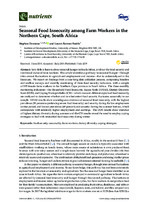Seasonal food insecurity among farm workers in the Northern Cape, South Africa
Abstract
Very little is known about seasonal hunger in South Africa, or about the food security and
nutritional status of farm workers. This article identifies a pathway to seasonal hunger—through
intra-annual fluctuations in agricultural employment and income—that is underanalyzed in the
literature. We report on findings from a year-long data collection process, comprising baseline
and endline surveys and monthly monitoring of three food security indicators, with a sample
of 195 female farm workers in the Northern Cape province in South Africa. The three monthly
monitoring indicators—the Household Food Insecurity Access Scale (HFIAS), Dietary Diversity
Score (DDS), and Coping Strategies Index (CSI)—which measure di erent aspects of food insecurity,
are analyzed to determine whether and to what extent food security fluctuates seasonally in our
sample. HFIAS results show unambiguous evidence of seasonal food insecurity, with the highest
prevalence (88 percent experiencing severe food insecurity) and severity during the low employment
winter period, and lowest prevalence (49 percent) and severity during the summer harvest, which
corresponds with relatively higher employment and earnings. The DDS results show evidence
of highest dietary diversity during summer and the CSI results reveal the need to employ coping
strategies to deal with intensified food insecurity during winter.

